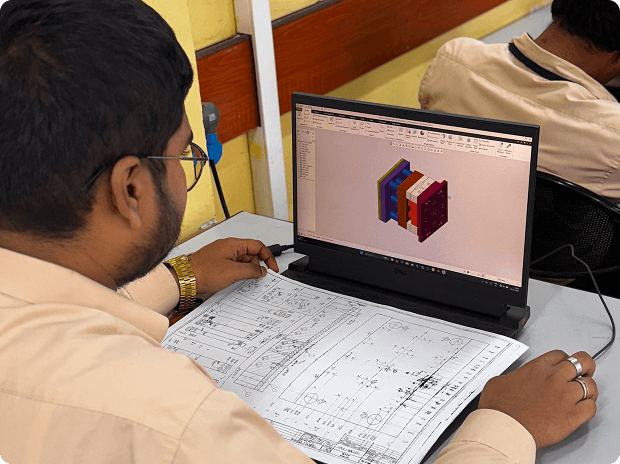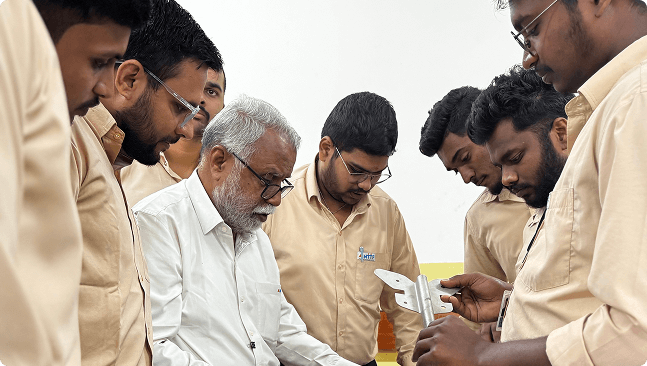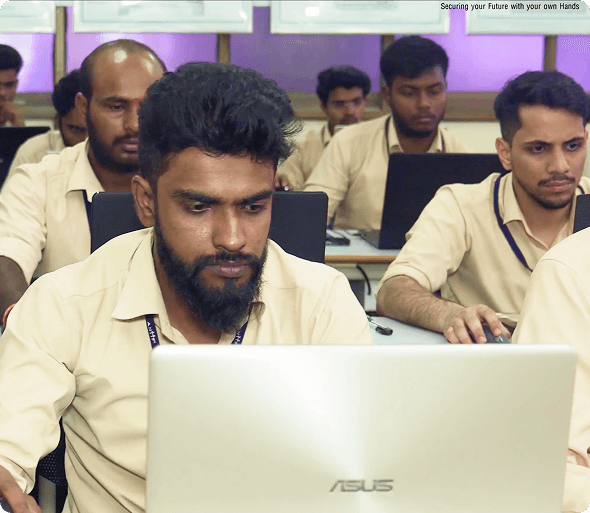
This program is tailored for individuals aspiring to pursue careers in Tool Engineering, Manufacturing Engineering, and CAD-CAM-CAE. It offers comprehensive training, covering diverse aspects such as designing press tools for complex sheet metal components and optimizing production processes for superior quality. Students can expect a holistic learning experience throughout the program, equipping them with the necessary skills for their chosen fields.
Our brochure offers a comprehensive overview of our courses, programs, and benefits to help you make informed decisions.
Gain a deeper insight into our institution and programs. Our prospectus provides detailed information to guide your educational journey.
To be eligible for this program, a student must meet one of the following criteria:
The program offers:
NTTF School of Postgraduate Studies (SPG)
Post Box No. 5857, 23/24, 2nd Phase, Peenya, Industrial Area, Bengaluru – 560058
The two-year program offered at Bangalore’s Peenya campus provides Engineering Graduates with advanced skills and knowledge in Tool Engineering and Manufacturing. The program emphasizes CAD/CAM/CAE and aims to meet the growing demands of industries.
At NTTF, we connect you with top-notch companies, opening doors to exciting career prospects. Join us and unlock a future filled with success, growth, and limitless potential!






















Boost your confidence with free mock tests designed to simulate real exams. Get instant feedback, track your progress, and improve smarter!




Explore how our trainees shine bright in the industry with NTTF’s guidance and expertise.
Advance your expertise, expand your network, and achieve your professional goals with our industry-aligned postgraduate programs.

A Master of Engineering (M.Eng. or ME) is a graduate-level professional degree focused on the practical and applied aspects of engineering, designed for those looking to advance their technical skills and career in engineering practice. Unlike a Master of Science, which emphasizes research, the M.Eng. program prioritizes hands-on projects, industry collaboration, and the application of advanced engineering principles. This degree is ideal for engineers aiming to deepen their expertise, gain leadership skills, or transition into managerial roles. For those interested, NTTF offers a Postgraduate Degree – M.E in Tool Engineering, specializing in the practical applications of engineering in the tooling industry.
Yes, a Master of Engineering degree is highly valued, especially in specialized fields like Tool Engineering. It enhances your technical expertise, making you more competitive in the job market. NTTF’s program is industry-aligned, ensuring graduates are equipped to meet the demands of modern engineering roles in sectors like automotive, aerospace, and consumer electronics.
The cost of a Master of Engineering degree in India can vary widely depending on the institution. NTTF offers a competitive fee structure for its Postgraduate Degree in Tool Engineering, with detailed information available upon request or during the admission process. Download our brochure for the fee details.
The duration of a Master of Engineering degree typically ranges from 1.5 to 2 years. NTTF’s Postgraduate Degree in Tool Engineering is a 2-year full-time program, offering comprehensive training in advanced tool design and manufacturing techniques. Our PGTE program has 3 Semester on campus and 1 Semester Industry internship with stipend, allowing students to continue with the same industry for job if nature of work is found suitable by both parties (student and respective industry).
Entrance exams for Master of Engineering programs vary by institution. For NTTF’s Postgraduate Degree in Tool Engineering, the selection process includes an entrance test, focusing on assessing the candidate’s aptitude and knowledge in relevant engineering fields.
The MEng qualification is a postgraduate degree that signifies advanced proficiency in a specific engineering discipline. NTTF’s MEng in Tool Engineering focuses on equipping students with both theoretical knowledge and practical skills needed to excel in tool design and manufacturing.
Yes, pursuing an MEng is definitely worth it, especially in a specialized and technical field like Tool Engineering. NTTF’s program not only enhances your technical skills but also increases your employability by providing industry-relevant training and project experience.
Eligibility for the Master of Engineering program at NTTF requires candidates to have a Bachelor’s degree in Engineering or a related field, with a strong foundation in subjects relevant to Tool Engineering. Specific eligibility criteria may vary, so it’s advisable to check NTTF’s admission requirements.
Like any advanced degree, a Master of Engineering requires dedication and hard work. The curriculum at NTTF is rigorous and designed to challenge students, but with the right approach and commitment, it is manageable and rewarding.
Courses in a Master of Engineering program vary by specialization. At NTTF, the Postgraduate Degree in Tool Engineering covers subjects such as Advanced Tooling Design and Development, CAD/CAM, Finite Element Analysis (FEA), and Manufacturing Processes, complemented by hands-on training and industry projects.
They are different but the Master of Engineering (MEng) is equivalent to the Master of Technology (MTech) in terms of academic rigor and recognition. Both degrees are considered equivalent in India and are respected by employers across industries. NTTF’s MEng in Tool Engineering is designed with a strong practical orientation, making it highly valuable in the engineering sector.
The MEng and MS degrees cater to different career paths. The MEng is often more application-focused, preparing students for industry roles, while the MS may be more research-oriented. NTTF’s MEng in Tool Engineering is ideal for those looking to enter the workforce with advanced technical skills.
Absolutely. A Master of Engineering degree, especially from NTTF, opens up numerous job opportunities. Graduates can pursue roles in Tool Design, Manufacturing, R&D, and Product Development. NTTF’s strong industry connections and emphasis on practical skills ensure that graduates are well-prepared for engineering positions in top companies.
Yes, an MEng degree enhances your qualifications as an engineer, particularly in specialized fields. Graduates of NTTF’s MEng in Tool Engineering are well-prepared to take on roles in tool design, manufacturing, and product development.
With an MEng in Tool Engineering from NTTF, you can pursue various roles, including Tool Designer, Manufacturing Engineer, Product Development Engineer, R&D Engineer, and more. The program’s industry-oriented training ensures you are job-ready upon graduation.
The benefits of an MEng degree include advanced technical knowledge, higher employability, and better job prospects. NTTF’s program also offers hands-on experience and industry connections, giving graduates a competitive edge in the job market.
Yes, the MEng is considered equivalent to MTech in India. Both degrees are recognized by employers and educational institutions alike. NTTF’s MEng in Tool Engineering provides the same level of advanced education and practical skills as an MTech.
Yes, the MEng is a higher degree than a Bachelor’s degree, offering specialized knowledge and skills that are essential for advanced engineering roles. NTTF’s program is designed to meet the demands of industry professionals and prepares graduates for leadership positions.
MEng in Mechanical Engineering focuses on the design, analysis, and manufacturing of mechanical systems. While NTTF’s Postgraduate Degree in Tool Engineering is a specialized branch of Mechanical Engineering, focusing on the design and manufacturing of tools, dies, and molds, essential for various industries.
The NTTF School of Postgraduate Studies empowers B.E and B.Tech graduates with specialized programs in Tool Engineering and Product Design, combining expert faculty, hands-on training, and strong industry partnerships for successful careers.